4 Causes of Fatigue, Anxiety, and Overwhelm

Fatigue, anxiety, and overwhelm. Can you relate? Today, we’re exploring a topic that you may find all too familiar. These are among the top symptoms my clients come to me with (other common symptoms are gut-related—which can also be tied to fatigue, anxiety, and overwhelm.). And yet they are often dismissed as a “normal” part of modern life—but these symptoms are clues that something deeper is going on in your body and shouldn’t be ignored.
If you search online for causes of fatigue, anxiety, and overwhelm, you’ll likely find “mental/emotional disorders”, and “infection”. Wow, really?! (And you’d likely be treated with medication if you went to an allopathic practitioner.) While those “causes” may play a role in some cases, several basic foundational causes are much more likely to be at the root of your fatigue, anxiety, and overwhelm.
From a naturopathic and functional wellness perspective, I help my clients get to the root of these symptoms by diving into four key areas of wellness (and I recommend reading the following books on each topic to learn more):
- Hydration (The Salt Fix)
- Sleep (Why We Sleep)
- Stress management (The Invisible Load: Overcoming Stress and Overwhelm)
- Nutrient deficiencies (Magnesium: The Missing Link to Total Health)
Resolving these foundations of health can quickly help you regain your energy, calm your mind, and restore balance in your life.
The power of hydration
Water is the essence of life. Our bodies are made up of about 60% water (salt water, actually), yet even a slight dip in your hydration levels can have a significant impact on how you feel. Dehydration is more common than many people realize, especially among busy women who may forget to drink enough water throughout the day. And even mild dehydration can lead to fatigue, anxiety, overwhelm, headaches, and difficulty concentrating or sleeping.
When you’re dehydrated, your blood volume decreases, which means less oxygen and nutrients reach your muscles and brain. This can leave you feeling sluggish and mentally foggy. Dehydration can also disrupt the balance of electrolytes in your body, which are crucial for nerve and muscle function. This electrolyte imbalance can disrupt your physical balance (this is especially important for older people who tend to not drink enough either, and dehydration often precipitates falls.)And it can trigger anxiety and mood swings, making it harder to cope with daily stress.
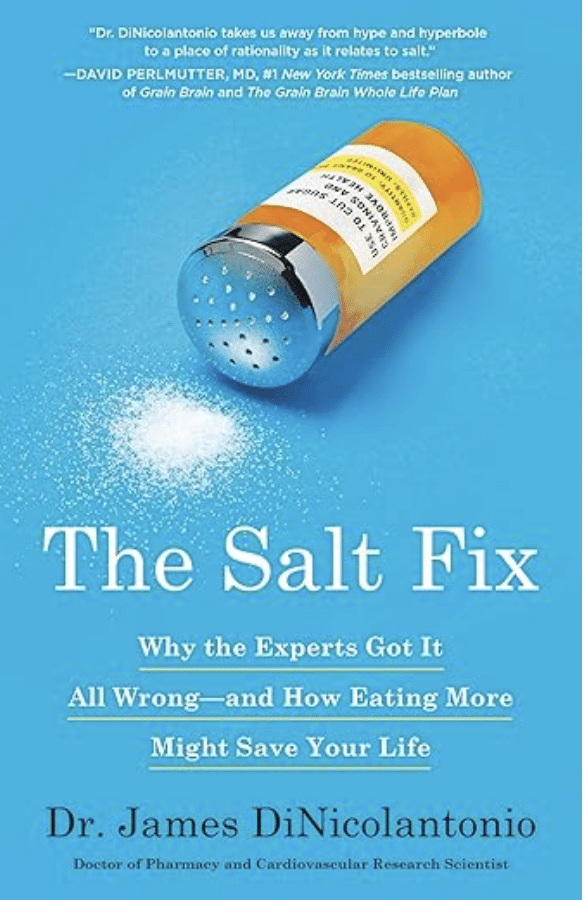
That’s one reason I use and recommend daily electrolytes and sea salt in your water. I love Ultima Replenisher brand which has lots of great flavors. If you’re not a fan of flavored water, check out Hi-Lyte K1000 which has no flavor. Sea salt is also a great way to get the minerals you need each day (read The Salt Fix), there is SO MUCH that modern science got wrong when it comes to sodium. Processed/bleached table salt and high-sodium processed food is NO BUENO. Hover, humans have been eating and thriving on sea salt for over 300,000 years…it’s so important that sea salt was once used as currency! And sea salt does NOT cause heart disease.
“Sea Salt has 72 minerals, including sodium, whereas table salt is just sodium chloride. Those 72 trace minerals used to come from mineral-rich spring water, but now our drinking water is filtered taking the minerals out of it. Sea salt dissolved in drinking water helps ionize the minerals, making them easier to absorb into the cells, pulling water in with them. Cells need water for their biochemical processes.” —Dr. Carolyn Dean, M.D.
Root Causes of Dehydration
There are several reasons why you might not be drinking enough water:
- Lack of awareness: You might not feel thirsty until you’re already dehydrated.
- Diuretics: Caffeine and alcohol increase urine output, which can lead to dehydration.
- Stress: High-stress levels can increase your body’s water needs.
- Chronic conditions: Health issues like diabetes can cause increased water loss through urine.
- Environment: Hot weather, high altitudes, and air travel also require more water intake.
Impact on Your Body and Mind
Dehydration can manifest in several ways:
- Fatigue: Reduced blood volume means your body has to work harder to circulate oxygen, leading to exhaustion, and headaches.
- Anxiety and mood swings: Electrolyte imbalances can affect brain function, leading to increased anxiety and irritability.
- Brain fog: Dehydration impairs cognitive function, making it harder to focus and remember things.
Actionable Steps
- Increase your water intake: divide your body weight in pounds by 2, and drink that many ounces of water a day, plus more if you’re active or in a hot environment. (eg: 130 lbs / 2 = 65 oz water/day, or about two 32 oz bottles of water.)
- Balance water with diuretics: For every cup of coffee or alcohol, drink an extra glass of water.
- Add in minerals: electrolytes and sea salt added to your water help get that water into your cells.
- Hydration reminders: Use apps or set reminders to help you stay on track.
The foundation of sleep
Sleep is the foundation of health. It’s during sleep that your body repairs itself, consolidates memories, and regulates hormones. Despite its importance, many women struggle with sleep, either having trouble falling asleep, staying asleep, or waking up feeling unrefreshed. (Improving sleep is one area where I’ve significantly helped many of my clients.)
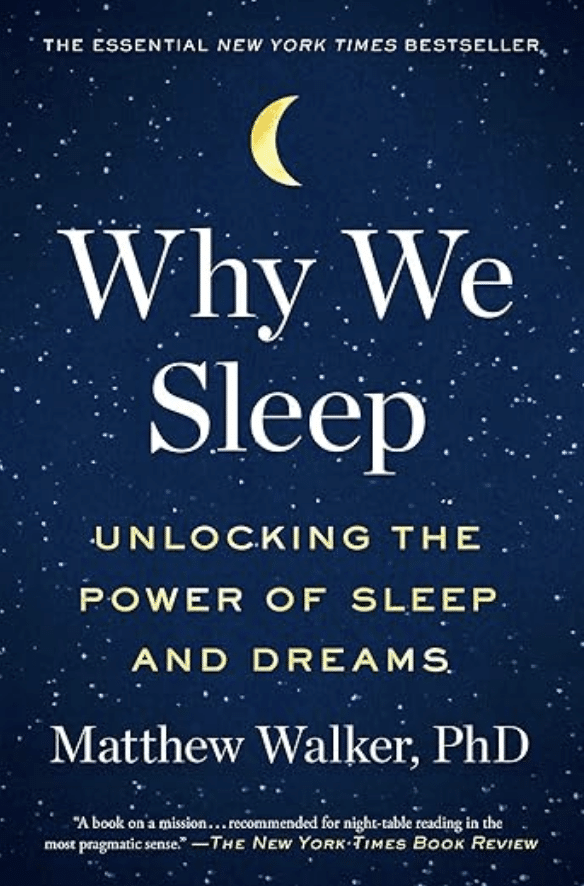
Your brain uses sleep to clear out toxins that accumulate during the day, a process essential for maintaining cognitive function. As the book Why We Sleep dives into, without adequate sleep, your body can’t complete this vital detox process, leading to mental and physical fatigue.
Recently my husband and I have started wearing Oura Rings to track our health. And they are giving us a great picture of our sleep patterns—including how much time we spend in deep sleep, REM sleep, and how much time we are awake in the night. It’s been a bit surprising! I did a ton of research before purchasing a wearable health-tracking tool (I looked at Apple Watch, Garmin, and Woop), and decided on the Oura Ring as being the least obtrusive to wear. I hardly notice it, and love that it tracks all our daily activity and sleep, to help us bio-hack our health—and highly recommend this tool if you’re interested in tracking your health metrics.
Root Causes of Poor Sleep
Several factors can disrupt your sleep:
- Stress: High-stress levels can keep your mind racing, making it difficult to relax and fall asleep.
- Technology: Exposure to blue light from screens before bed can interfere with your body’s natural sleep-wake cycle, delaying the production of melatonin, your sleep hormone.
- Poor sleep environment: Noise, light, and uncomfortable temperatures can prevent deep, restorative sleep. Sleeping with your pets can also hamper your sleep.
- Nutrient deficiencies: A lack of magnesium, B vitamins, and other key nutrients can impair sleep quality.
- Bedtime: Getting to bed too late can hinder your sleep (that “second wind” that turns you into a night owl is actually intended for your body to use to repair itself, not for you to keep working.)
Impact on Your Body and Mind
Poor sleep affects your body in several ways:
- Fatigue: Lack of restorative sleep leads to both physical and mental exhaustion.
- Mood instability: Sleep deprivation increases the risk of anxiety, irritability, and even depression. (In fact, fewer than 6 hours of sleep for just one night can make you more anxious and paranoid.)
- Cognitive decline: Without sufficient sleep, your memory, concentration, and decision-making abilities suffer.
Actionable Steps
- Establish a sleep routine: Go to bed and wake up at the same time every day, even on weekends.
- Create a bedtime ritual: Engage in relaxing activities before bed, like reading or taking a warm bath, and avoid screens for at least one hour before sleep.
- Optimize your sleep environment: Keep your bedroom dark, cool, and quiet. Consider using blackout curtains, earplugs, or a white noise machine. I also love my NodPod!
- Consider supplements: Magnesium can help relax the body and improve sleep quality. Some studies suggest that magnesium supplementation can reduce insomnia in older adults. Taurine (an amino acid) can also help promote sleep.
Understanding Stress
Stress is a natural response to challenging situations, and is not always inherently bad. Your body may interpret a variety of internal and external changes as “challenges” including things you love doing (like dancing, or running). Periods of high stress followed by rest and relaxation can be good for your body, keeping it on its toes, so to speak. Hormesis—a.k.a., “Whatever doesn’t kill you makes you stronger.”
However, when stress becomes chronic (without breaks for rest/relaxation), it can take a toll on your health. Chronic stress keeps your body in a constant state of sympathetic nervous system (fight-flight-freeze mode), leading to prolonged exposure to cortisol. While cortisol is beneficial in the right amounts, helping you to react quickly in emergencies—consistently elevated levels can wreak havoc on your body. And too much cortisol can inhibit melatonin production disrupting your sleep at night.
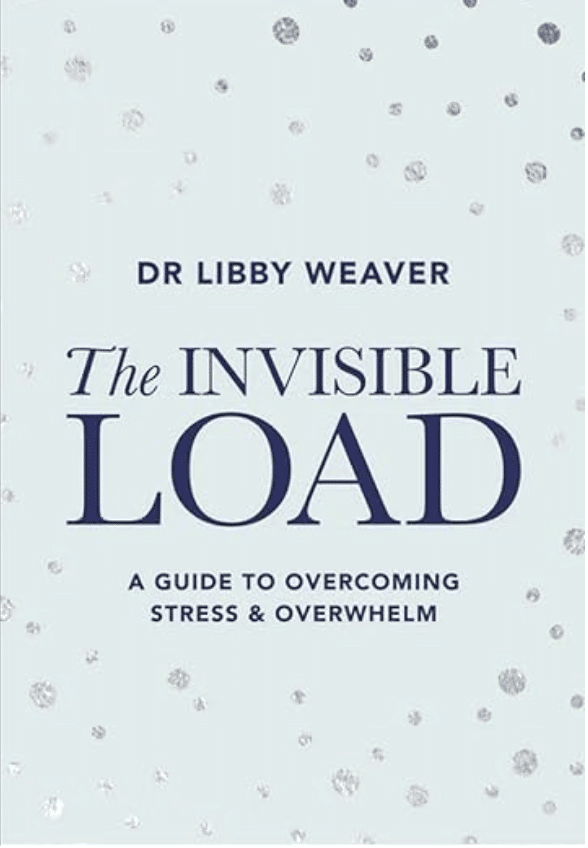
Stress is a big pre-cursor to overwhelm, and I highly recommend reading the book Invisible Load. In her book, Dr Libby Weaver helps you to illuminate your invisible load to provide insight into what’s driving the sense of overwhelm you feel for everyday tasks. Amazon has the e-book. And if you want a physical book, you’ll have to order it from Dr. Libby’s website, where it ships from New Zealand.
The Oura Ring also tracks stress levels, which has been super eye-opening for me too. It uses heart rate, heart rate variability, blood oxygen, body temperature, and other metrics to determine when you’re in a state of stress. Sometimes it shows that I’m stressed when I don’t think I am. So when the app indicates I’m stressed, I take a break for some box breathing, or maybe meditate for a few minutes, and my stress indicators drop right down. It’s fascinating to see this in action! Paying attention to self-care can also go a long way towards your stress recovery and resolving overwhelm. Download my free A-Z Self-Care Guide here.
Root Causes of Chronic Stress
- Overcommitment: Trying to juggle too many responsibilities without adequate rest and recovery.
- Lack of boundaries: Difficulty saying no or setting limits can lead to overwhelming stress.
- Poor self-care: Neglecting your own needs in favor of others can deplete your energy reserves.
- Nutrient imbalances: Chronic stress depletes essential nutrients like magnesium, vitamin C, and B vitamins, which are crucial for stress management.
Impact on Your Body and Mind
Chronic stress affects your well-being in multiple ways:
- Fatigue: Stress drains your energy, making you feel tired all the time.
- Anxiety and overwhelm: High cortisol levels contribute to feelings of anxiety and make it hard to relax.
- Weakened immune system: Stress reduces your immune function, increasing your susceptibility to illness.
- Adrenal insufficiency: high cortisol levels due to overworked adrenal glands can also make you have to pee frequently, which can contribute to dehydration
Actionable Steps
- Practice mindfulness: Techniques like meditation, deep breathing, and yoga can help reduce stress levels. Research shows that mindfulness-based interventions can significantly lower cortisol levels and reduce stress. I meditate daily with Roger Gabrial on Instagram.
- Set boundaries: Learn to say no and prioritize your needs. This might involve reassessing your commitments and making time for rest and self-care. (When asked to do something, take a moment to close your eyes and FEEL inside your body. If you say YES to this commitment, how does it FEEL? If you say NO to this commitment, how does it FEEL? Trust your intuition/feelings to guide you to the right answer for you—which might not be the answer someone else wants to hear, but it will help you set healthy boundaries.)
- Incorporate stress-reducing activities: Regular physical activity, spending time in nature, and engaging in hobbies can all help to lower stress levels.
- Support your body: Consider supplements like magnesium and adaptogens (e.g., ashwagandha) to help your body cope with stress. Adaptogens have been shown to reduce stress and fatigue in clinical trials.
The role of nutrient deficiencies
Nutrient deficiencies are surprisingly common, even among those who try to eat a healthy diet. Most people are unaware that 90% of Americans are deficient in at least one vital nutrient. As the saying goes, “Garbage in, garbage out”. If you’re not fueling your body with the vital nutrients (substrate) it needs to build new healthy cells or perform hundreds of thousands of actions on your behalf every second—it literally can’t physically do those things. Nutrient deficiencies in themselves can lead to fatigue, anxiety, and overwhelm.
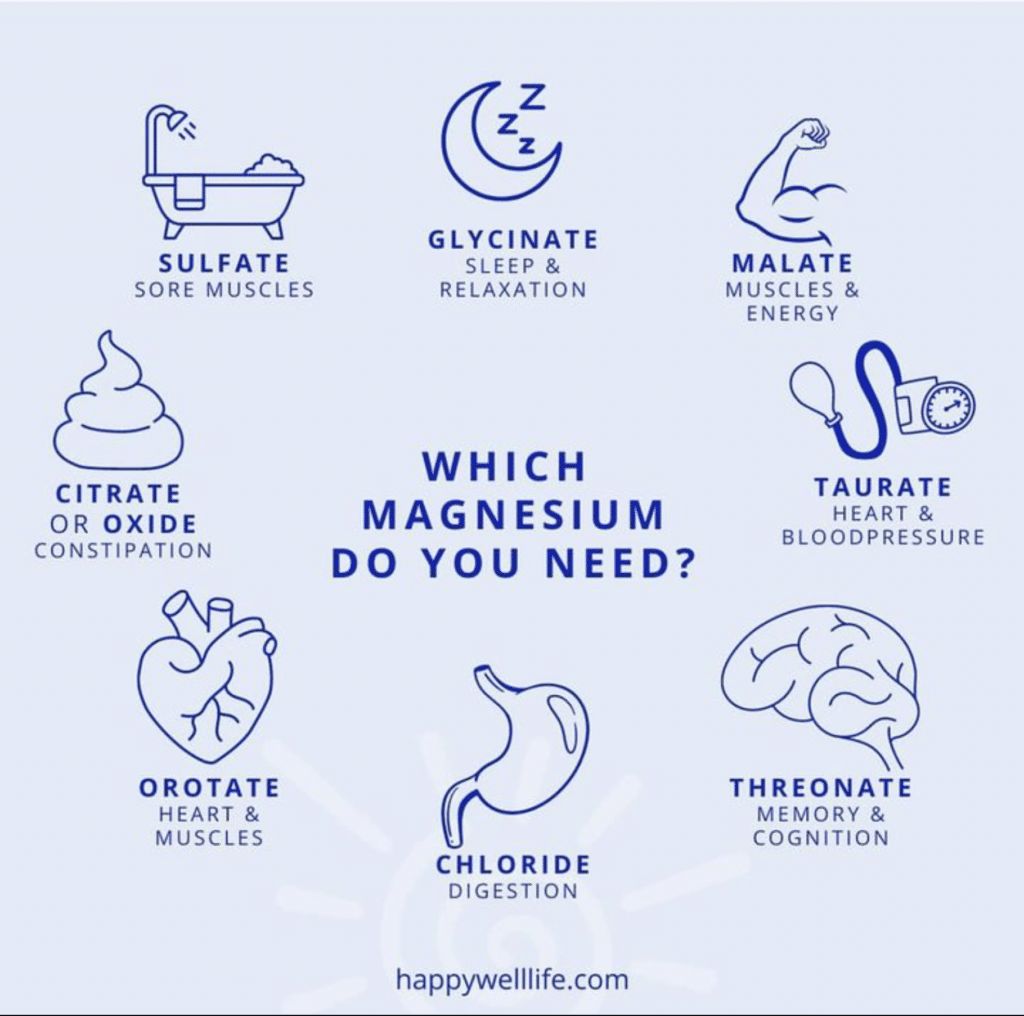
If you truly want to be healthy, I recommend reading Dr. Carolyn Dean’s book Magnesium: The Missing Link to Total Health. Certain nutrients are particularly important for managing fatigue, anxiety, and overwhelm, magnesium is key among them.
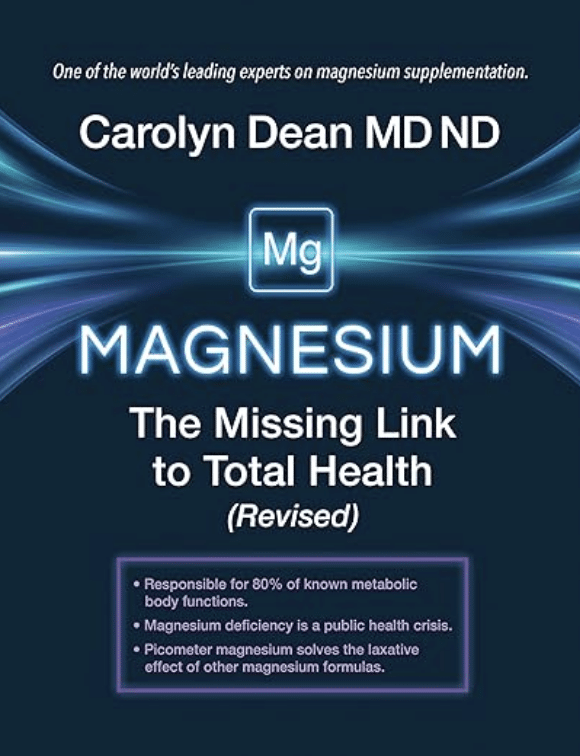
- Magnesium: Essential for over 300 biochemical reactions, (and 80% of bodily actions) including those that regulate stress and sleep. Low magnesium levels have been linked to increased anxiety, poor sleep, and heart disease. Note: unless you’re constipated, do NOT supplement with magnesium oxide, as it’s not absorbed by the body. Magnesium Taurate is great for heart health, magnesium L-threonate is great for brain health, and magnesium glycinate or magnesium citrate are also well absorbed. I use Dr. Carolyn Dean’s liquid ReMag, as well as other professional brands on Fullscript.
- Vitamin D: Supports immune function, mood regulation, and bone health. Vitamin D deficiency is common, particularly in areas with limited sunlight, and is associated with an increased risk of depression, as well as more frequent colds/flu since it plays a vital role in your immune system. Your vitamin D level should be between 50-80 ng/dL. Note: Vitamin D needs magnesium to convert to the useable form, so ensure optimal magnesium first, before supplementing with vitamin D.
- B Vitamins: Crucial for energy production, brain health, and managing stress. A deficiency in B vitamins, especially B12, can lead to fatigue, brain fog, and mood disturbances. Note: supplementing with B vitamins should always be done in the morning, as they can increase your energy/activity and hamper sleep if taken at night.
- Iron: Necessary for oxygen transport in the blood. Iron deficiency can cause anemia, leading to persistent fatigue and weakness. Note: the body more easily absorbs heme iron from meat than iron from plant sources. Consider taking a multi-organ supplement like CODEAGE Grass-fed Beef Organs, as a good source of iron.
Root Causes of Nutrient Deficiencies
- Poor diet: Diets high in processed foods often lack essential nutrients.
- Stress: Chronic stress depletes important nutrients, particularly magnesium and B vitamins.
- Gut health issues: Poor gut health can impair nutrient absorption, even if you’re eating a balanced diet. Stress can reduce digestive secretions by up to 90%, making it difficult to digest and absorb nutrients from your food if you’re stressed.
- Medications: Some medications, like antacids and antibiotics, can interfere with nutrient absorption or increase nutrient requirements.
Impact on Your Body and Mind
Nutrient deficiencies can have a profound effect on your overall health, including:
- Fatigue: Nutrient deficiencies can directly lead to low energy levels.
- Mood disturbances: Lack of certain nutrients can contribute to anxiety, depression, and irritability.
- Cognitive issues: Poor nutrient status can lead to brain fog, poor concentration, and memory problems.
Actionable Steps
- Get tested: Work with your wellness practitioner to identify any nutrient deficiencies through blood tests or other diagnostic tools. (This is another area I help my clients with, and we can tell a lot about nutritional deficiencies from a basic CMP (comprehensive metabolic panel) and CBC-D (complete blood count with differential). Check out my blood lab packages here.
- Prioritize real, whole foods: Focus on a diet rich in vegetables, fruits, lean proteins, and healthy fats to ensure you’re getting a wide range of nutrients.
- Support digestion: Improving gut health with probiotics, digestive enzymes, and a diet rich in fiber can enhance nutrient absorption and overall well-being.
Addressing the root causes of fatigue, anxiety, and overwhelm can have a transformative impact on your health and quality of life. By focusing on hydration, sleep, stress management, and nutrient deficiencies, you can start to feel more energized, calm, and in control. Remember, small changes can lead to significant improvements. Start by implementing one or two actionable steps from this post and see how they affect your well-being.
Typically I don’t recommend supplementing with nutrients before looking at blood labs first. If you have symptoms of fatigue, anxiety, and overwhelm, there’s a good chance you may have low digestive enzymes and low stomach acid—which means you may not digest/absorb nutrients from your food or supplements either. So supplementing can just be a big waste of money and lead to expensive pee and poop! Digestion is a great place to start your wellness journey—book a free call today to see how I can help.
I hope you now feel empowered to take back your health and resolve your fatigue, anxiety, and overwhelm. Please leave a comment with your biggest takeaway from this article.

Excellent info. Thanks Heidi!
So glad it resonated with you Jacquie!